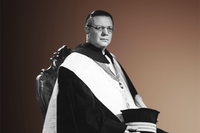Felice Battaglia
Jurist, Philosopher, Rector of the University of Bologna, Professor of Moral Philosophy and Philosophy of Law, Director of the Institute of Philosophy, Dean of the Faculty of Literature and Philosophy, President of the High Council for Public Education (Palmi, Reggio Calabria, 23 May 1902 - Bologna, 28 March 1977).

A high sense of social and intellectual responsibility always characterised his work, both as teacher and as university rector. Under him, the University rose from the devastation of World War II, fully entering a period of economic boom and student participation.
Felice Battaglia was born in Palmi (Reggio Calabria) in 1902. Following the Messina earthquake of 1908, he and his family moved to Rome, where he completed his university studies, graduating in Law in 1925 with a dissertation on Marsilio da Padova, published in 1928. Alongside his legal training, he also followed courses in Literature and Philosophy, with teachers such as Vittorio Emanuele Orlando, Gaetano Mosca and Giorgio Del Vecchio. The latter introduced him to neo-Kantism and idealism. This combination of law and philosophy formed the core of his future theoretical speculation.
In 1927, Battaglia was awarded a professorship in Philosophy of Law, thus launching his academic career. However, to support his family, he was also employed at the Ministry of Education until 1932, when he was assigned a chair at the University of Siena.
A few years later, in 1938, he moved to Bologna, teaching at the University there for the rest of his life. For decades, he held the dual role of teacher of Moral Philosophy at the Faculty of Literature (1938-1972) and of Philosophy of Law at the Faculty of Law (1939-1945 and 1958-1963), representing a bridge between the two academic fields.
Battaglia stood out not only for his theoretical reflection, but also for his institutional commitment.
When Bologna was liberated on 21 April 1945, he was given the post of Commissioner of the University, after Goffredo Coppola's time as rector came to an end. This was a very delicate role, which only lasted a few days, until 5 May, when first the vice rectorate and then the rectorate were assigned to Edoardo Volterra, a jurist who had previously been dismissed from teaching due to the fascist racial laws.
Battaglia was then appointed Dean of the Faculty of Literature from 1945 to 1950 and Director of the Institute of Philosophy for almost two decades, from 1960 to 1977. However, he reached the pinnacle of his university career with his appointment as Rector of the University of Bologna, a position he held in two distinct periods: from 1950 to 1956 and again from 1962 to 1968. In those years, he made a decisive contribution to relaunching the University after World War II, promoting a cultural climate of openness and innovation, in line with his liberal and spiritualist vision, which he also applied to the University, a place he saw as offering free elaboration of thought.
His second rectorate, however, ended under tense circumstances. In a context marked by profound social and student transformations, Battaglia resigned as Rector on 22 March 1968. His resignation was initially suspended, but still it marked the end of his presence in the University’s top echelons. The reasons for this decision were probably as much due to the growing unrest of that time as to the moral and intellectual coherence that had always marked his actions: while he rejected authoritarian management, he could not accept that there should not be at least the minimum conditions of academic authority based on dialogue.
Battaglia was a member of important national bodies, including the High Council for Public Education, the National Board of Education and the Commission for School Reform.
On a cultural level, he was among the founders and promoters of the Centre for Philosophical Studies in Gallarate, which became a point of reference for Italian spiritualist thought. His wide-ranging intellectual production touched on the fundamental themes of law, morality, history and politics, offering an original synthesis of idealism, historicism and Christian spiritualism. His main writings include “Diritto e filosofia della pratica” (Law and Philosophy of Practice), “Il valore nella storia” (Value in History), “I valori fra la metafisica e la storia” (Values between Metaphysics and History) and “Economia, diritto, morale” (Economics, Law, Ethics).
Felice Battaglia died in Bologna on 28 March 1977, leaving behind an academic and speculative legacy that is reflected in the training of prominent students, such as Nicola Matteucci, Guglielmo Forni Rosa and Enzo Melandri.
The University of Bologna has dedicated the Philosophy section of the Philosophy and Communication Library to him, while the City Council has named a street after him, thus paying tribute to an intellectual who made reflection and university service the marks of his entire existence.
